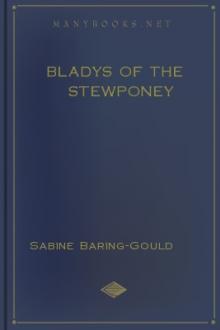The Broom-Squire - Sabine Baring-Gould (life books to read .txt) 📗

- Author: Sabine Baring-Gould
Book online «The Broom-Squire - Sabine Baring-Gould (life books to read .txt) 📗». Author Sabine Baring-Gould
"Whose fault is that? Home weren't good enough for he. Even the Old Ship on the sign-board didn't give him satisfaction, and he must alter it. I don't see why I should worrit myself about the hay or any other thing. I'll just put up my feet an enjye myself."
"Simon, I pray you answer Iver's letter. Opportunities be like fleas, to be took sharp, or away they goes, they be terrible long-legged. Opportunities only come now and then, and if not caught are lost past recall. 'Twas so wi' Temperance Noakes, who might a' had the chimbley-sweep if she'd a kissed him when he axed. But she said, Wipe and wash your face fust--and she's an old maid now, and goin' sixty. Consider, Simon. Iver be your son, your only child. It's Providence makes us wot we is; that's why you're a man and not a woman. Iver hadn't a gift to be a farmer, but he had to paintin'. It can't be other--it's Providence orders all, or you might be a mother and nursin' a baby, and I smokin' and goin' after the plough in leggin's."
"That's all gammon," growled the landlord.
"We be gettin' old," pursued Mrs. Verstage. "In the end you'll have to give up work, and who but Iver is to come after you here?"
"Him--Iver!" exclaimed Simon. "Your own self says 'e ain't fit to be a farmer."
"Then he may let the farm and stick to the inn."
"He ain't got the makin' of a publican in him," retorted the man; "he's just about fit for nothin' at all."
"Indeed, but he is, Simon," pleaded the woman, "only not in the way you fancies. What good be you now in a public-house? You do nothing there, it is I who have all the managin'."
"I attend to the farm. Iver can do neither. All the money you and I ha' scraped together he'll chuck away wi' both hands. He'll let the fences down I ha' set up; he'll let weeds overrun the fields I ha' cleared. It shall not be. It never shall be."
"He may marry a thrifty wife, as you have done."
"And live by her labor!" he exclaimed, drawing his pipe from his mouth and in knocking out the ash in his anger breaking the stem. "That a child o' mine should come to that!"
"Iver is your own flesh and blood," persisted the woman, in great excitement. "How can you be so hard on him? It's just like that old fowl as pecked her eggs, and we had to wring her neck. It's like rabbits as eat their own young. Nonsense! You must be reconciled together. What you have you cannot leave to a stranger."
"I can do what I will with my own," retorted Simon. "Look here, Susanna, haven't you had that girl, Matabel, with you in place of a child all these years? Don't she work like a slave? Don't she thoroughly understand the business? Has she ever left the hogs unmeated, or the cow unmilked? If it pleases you to go to market, to be away for a week, a fortni't you know that when you come home again everything will be just as you left it, the house conducted respectable, and every drop o' ale and ounce o' 'backy accounted for."
"I don't deny that Matabel's a good girl. But what has that to do with the matter?"
"What! Why everything. What hinders me leavin' the whole pass'l o' items, farm and Ship to her? She'll marry a stiff man as'll look after the farm, and she'll mind the public-house every mite as well as ever have you, old woman. That's a gal as knows chalk from cheese."
Mrs. Verstage leaned back with a gasp of dismay and a cramp at her heart. She dropped her hands on her lap.
"You ain't speaking serious, Simon?"
"I might do wuss," said he; "and the wust I could do 'ad be to give everythin' to that wastrel, Iver, who don't know the vally of a good farm and of a well-established public-house. I don't want nobody after I'm dead and gone to see rack and ruin where all were plenty and good order both on land and in house, and that's what things would come to wi' Iver here."
"Simon, he is a man now. He was a boy, and what he did as a boy he won't do as a man."
"He's a dauber of paints still."
The taverner stood up. "I'll go and cast an eye over the hay-field," he said. "It makes me all of a rage like to think o' that boy."
He threw away the broken pipe and walked off.
Mrs. Verstage's brain spun like a teetotum; her heart turned cold.
She was startled out of her musings by the voice of Mehetabel, who said, "Mother, it is so hot in the kitchen that I have come out to cool myself. Where is father? I thought I heard him talking with you?"
"He's gone to the hay-field. He won't answer Iver's letter. He's just about as hard as one o' them Hammer Ponds when frozen to the bottom, one solid lump."
"No, mother, he is not hard," said Mehetabel, "but he does not like to seem to give way all at once. You write to Iver and tell him to come here; that were better than for me to write. It will not seem right for him to be invited home by me. The words from home must be penned by you just as though spoke by you. He will return. Then you will see that father will never hold out when he has his own son before his eyes."
"Did you hear all that father and I was sayin'?" asked the hostess, suspiciously.
"I heard him call out against Iver because he altered the signboard; but that was done a long time agone."
"Nuthin' else?"
"And because he would never make a farmer nor an innkeeper."
"It's a dratted noosence is this here porch," muttered the hostess. "It ort to 'a been altered ages agone, but lor', heart-alive, the old man be that stubborn and agin' all change. And you heard no more?"
"I was busy, mother, and didn't give attention to what didn't concern me."
"Oh!" said Mrs. Verstage, "only listened, did you, to what did concern you?"
A fear had come over the hostess lest the girl had caught Simon's words relative to his notion, rather than intention, of bequeathing what he had away from Iver and to the child that had been adopted.
Of course, Simon did not seriously purpose doing anything of the sort. It was foolish, inconsiderate of him to give utterance to such a thought, and that in such a place as the porch, whence every whisper was conveyed throughout the interior of the house.
If Mehetabel had overheard his words, what a Fool's Paradise she might create for herself! How her head might be turned, and what airs she might give herself.
Leave the farm, the inn, everything to a girl with whom they were wholly unconnected, and to the detriment of the son. Hoity-toity! such a thought must not be allowed to settle, to take root, to spring up and fructify.
"Mother," said the girl, "I think that you ought to write to Iver with your own hand, though I know it will cost you trouble. But it need not be in many words. Say he must come himself without delay and see father. If Iver keeps at a distance the breakage will never be mended, the wound will never be healed. Father is a resolute man, but he is tender-hearted under all, and he's ever been wonderful kind to me."
"Oh, yes, so long as he ain't crossed he's right enough with anyone," answered Mrs. Verstage quickly. She did not relish the allusion to the old man's kindness towards Mehetabel, it seemed to her suspicious heart due to anticipation of what had been hinted by him. She considered a moment, and determined to have the whole matter out, and to dash any expectations the girl might have formed at once and for ever. A direct woman Mrs. Verstage had ever been.
"Matabel," she said, and drew her lips together and contracted her brows, "whatever father may scheme about making a will, it's all gammon and nonsense. I don't know whether he's said any tomfoolery about it to you, or may do so in time to come. Don't think nuthin' of it. Why should he make a will? He has but Iver to whom he can leave what he has. If he don't make a will--where's the odds? The law will see to it; that everything goes to Iver, just as it ort."
"You will write to Iver to come?"
"Yes, I will. Matters can't be worse than they be, and they may come to a betterment. O dear life of me! What I have suffered all these years, parted from my only child."
"I have tried to do what I could for you, dear mother."
"Oh, yes"--the bitterness was still oozing up in the woman's heart, engalling her own mind--"that I know well enough. But then you ain't my flesh and blood. You may call me mother, and you may speak of Simon as father, but that don't alter matters, no more nor when Samuel Doit would call the cabbage plants broccaloes did it make 'em grow great flower heads like passon's wigs. Iver is my son, my very own child. You, Matabel, are only--"
"Only what, mother?"
"Only a charity girl."
CHAPTER IX.
BIDEABOUT.
The words were hardly spoken before a twinge of conscience made Mrs. Verstage aware that she had given pain to the girl who had been to her as a daughter.
Yet she justified herself to herself with the consideration that it was in the end kindest to cut down ruthlessly any springing expectation that might have started to life at the words of Simon Verstage. The hostess cast a glance at Mehetabel, and saw that her face was quivering, that all color had gone out of her cheeks, that her hands were contracted as with the cramp.
"I had no wish to hurt you," said the landlady; "but facks are facks, and you may pull down the blinds over 'em wi'out putting them out o' existence. There's Laura Tickner--got a face like a peony. She sez it's innade modesty; but we all knows it's arrysippelas, and Matthew Maunder tells us his nose comes from indigestion; but it's liquor, as I've the best reason to know. Matabel, I love you well, but always face facks. You can't get rid of facks any more than you can get rid of fleas out o' poultry."
Mrs. Verstage disappeared through the doorway. Mehetabel seated herself on the bench. She could not follow the hostess, for her limbs trembled and threatened to give way.
She folded her arms on her lap, and leaned forward, with her eyes on the ground.
"A charity girl! Only a charity girl!"
She said the words to herself again and again. Her eyes burnt; a spray hung on her eyelids. Her lips were contracted with pain, spasms ran through her breast.
"Only a charity girl! She'd never, never a'sed that had she loved me. She don't." Then came a sob. Mehetabel tried to check it, but could not, and the sound of that sob passed through the house. It was followed by no





Comments (0)